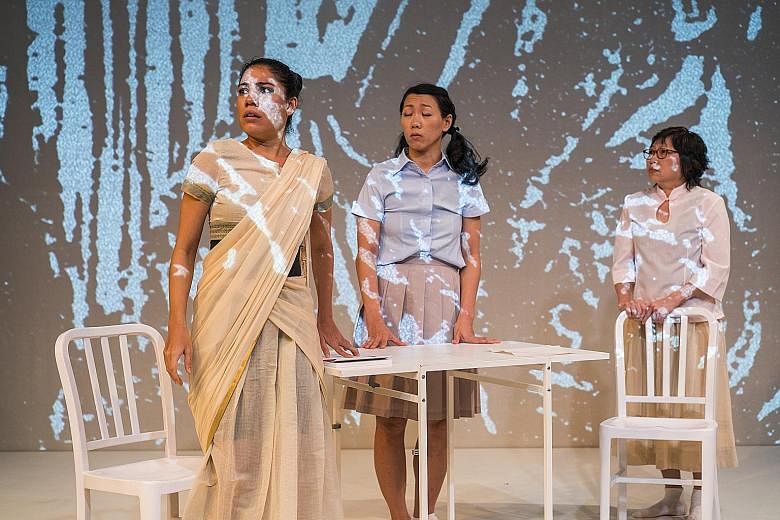REVIEW / THEATRE
MANIFESTO
Drama Box & The Necessary Stage
The Necessary Stage Black Box/ Wednesday
Manifesto is a fascinating collaboration between theatre stalwarts Drama Box and The Necessary Stage, coming just as the Drama Box's artistic director Kok Heng Leun announced his application to be a Nominated Member of Parliament.
The Necessary Stage's artistic director Alvin Tan is a core member of artists network Arts Engage, which has been vocal in raising issues such as censorship.
Manifesto is a strident yet subtle answer to the question of whether artists should be political. How can they not be, the script points out, in a democracy, where every citizen has the right to vote?
The 140-minute-long production also addresses the idea that art is manipulative and untrustworthy, and, by extension, artists are that way as well. The production offers deliberately skewed alternative narratives of Singapore's history, present and future through the fortunes of artists in various decades. Through theatrical sketches, soundscapes and a mixed-media art installation designed by Chan Silei, attributed to a character played by Koh Wan Ching, viewers encounter pioneering playwrights, actors and painters in 1956 and watch their legacies affect other artists all the way into 2024.
Many of these stories are expressed through multimedia (the always effective Loo Zihan), or with well-timed soundscapes by Bani Haykal adding an unwanted reminder that the audience is watching a performance. This is especially disconcerting when considering the narrative of a former political detainee, played by a riveting Ellison Tan Yuyang.
Her video confession of 1988 is broadcast on screen to the audience just before a live interview in 2016 with a film-maker, where she claims the confession was scripted. As she speaks some of her most powerful lines, her back is to the audience. A camera broadcasts her face onto the same screen, generating suspicion over the trustworthiness of this performance too.
Tan's single role is the exception in this play where most of the cast switch crisply and effectively between multiple characters and languages. The use of Mandarin, Malay and English gives way to mostly English by the 1980s, mirroring a shift in Singapore away from traditional roots.
But when the characters of this decade talk, words are missing, echoing their fear of speaking their minds as ever-present cameras take on looming significance. When Sharda Harrison, in her role as activist Sheila De Cruz, allows herself to start completing her sentences again in 2016, it is one of the most moving moments of the play.
In Manifesto, the strengths of both troupes combine to create something instantly recognisable as a work from either and something new as well.
The Necessary Stage's facility with intimate theatre allows multiple, nested storylines to build into one panoramic whole.
Drama Box's experience with forum theatre at last year's Singapore International Festival of Arts is scripted in to add nuanced shades to what seems like a black-and-white discussion of freedom of expression versus the constraints of high office - literally black and white, thanks to costume design from Max.Tan, which echoes the characterisation.
As the R18 rating suggests, Manifesto is a show for mature minds. It conducts conversations about racial, sexual and religious prejudice, about power and the allowable limits of artistic expression.
It is also an unforgettable statement of what artists hope to achieve through their work, including to start conversations, not end them.
The fact that such a play can be presented here at this time shows perhaps that they are not very far away from their goals after all.
• Manifesto is sold-out.


